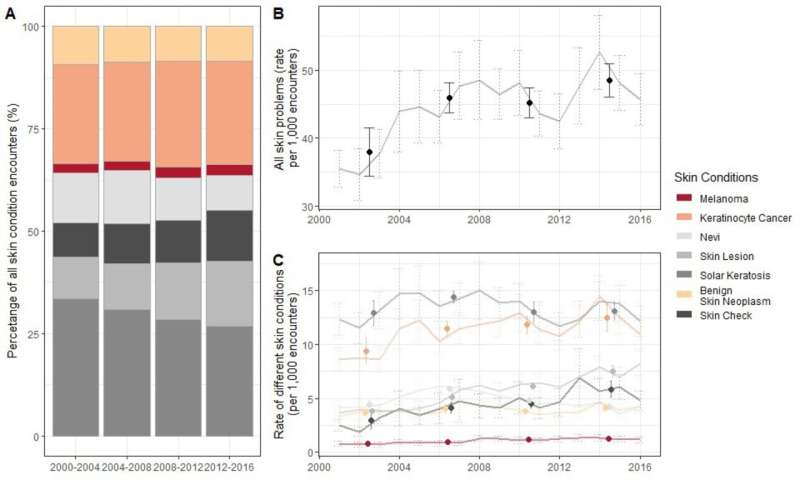This article has been reviewed according to Science X's editorial process and policies. Editors have highlighted the following attributes while ensuring the content's credibility:
fact-checked
peer-reviewed publication
trusted source
proofread
Study: GPs managing more skin cancer cases as cost of treatment climbs in Australia

Patients, especially men, living in regional and rural areas are increasingly presenting to GPs for skin cancer and related conditions, according to a national survey conducted by the Daffodil Center.
Older men make up the bulk of people turning to their general practitioner (GP) to manage skin cancers and skin cancer-related conditions, according to a national survey of GPs.
The study, published today in the BMJ Open and led by researchers at the Daffodil Center, a joint venture with the University of Sydney and Cancer Council NSW, analyzed data from more than 15,000 GPs over the course of 16 years as part of the BEACH (Bettering the Evaluation and Care of Health) study.
It is the first study to measure the full scope of skin-cancer related conditions being managed in general practice in Australia. Australia has the highest skin cancer incidence in the world and, treatments for melanoma and other skin cancers cost the healthcare system over $1 billion each year and climbing.
The researchers found that skin cancer-related conditions accounted for three percent of all problems managed in general practice.
Over the course of the study, management rates in general practice increased for melanoma and keratinocyte cancers (basal cell carcinomas and squamous cell carcinomas), skin checks, skin lesions, and benign skin growths.
Doctors were more likely to see male patients, aged over 65, who lived in Queensland or in regional or remote areas, from an English-speaking background and lower socio-economic areas.
However, the type of skin cancer related condition managed varied by age-group, with young adults more likely to be seen in general practice for a mole check or skin check, and for older age groups to be seen for established skin cancers or their early precursors on sun-damaged skin.
"Skin-cancer related conditions come in a broad spectrum, and each case is different," says Professor Anne Cust, senior author of the paper and Deputy Director of the Daffodil Center.
"But our study gives doctors and policymakers a better understanding of who is being affected by these skin cancer related conditions, where they are being treated, and where we can direct resources and education programs to reduce the number of people affected by these diseases every year.
"It's vital that we get the right resources to where they're needed most, especially in regional and rural areas where skin cancer incidence is very high and access to specialist care is more limited. It's also a good reminder that simple actions like wearing sunscreen, a broad-brimmed hat, protective clothing, seeking shade and avoiding going out when UV rays are at their strongest, can significantly lower your risk of developing skin cancer."
More information: Gillian Reyes-Marcelino et al, Skin cancer-related conditions managed in general practice in Australia, 2000–2016: a nationally representative, cross-sectional survey, BMJ Open (2023). DOI: 10.1136/bmjopen-2022-067744



















